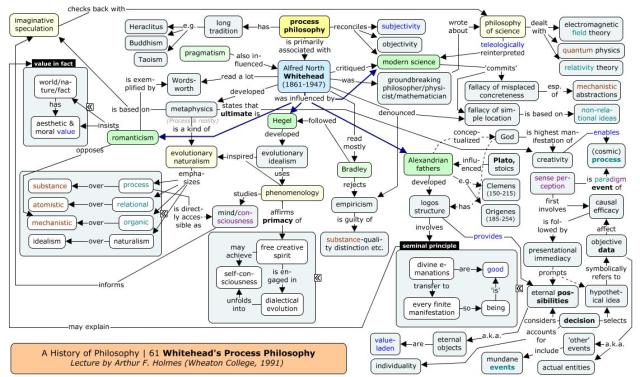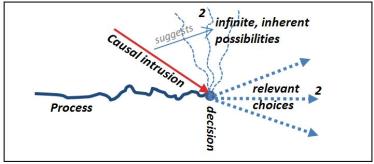To explain by what I mean by "value" or "beauty" or "generative creation" from my past article, I here use Matthew Segall's explanation of Whitehead's meaning of processual "value". And to help make Matthew's article a bit more readable I have overlaid an outline upon it in hopes of making Whiteheadian thought a bit more digestible.
One final thought. Rather than taking Whitehead's process philosophy and giving to it theological words from the bible and from a loving God, I would prefer to let the reader hear in Whitehead's words the parallel words which Process Theology will conjoin, favor, and elucidate within the greater context of a Christian Process Theology.
R.E. Slater, May 19, 2023
A Short Process Series on the God of Generative Value & Love
1. Philosophy has tended to collapse reality into one or the other of the “ideal opposites” explicated by Whitehead: Permanence and Flux. Plato, for example, over-emphasized the “eminent reality” of permanence by raising his Eternal Forms above the physical world of ever-shifting sensory experience. The world of Ideas was considered ultimate, while the world of physical sensations was demoted to “mere appearance,” or worse, “illusion.”2. On the other end of the philosophical spectrum, David Hume completely disregarded what Whitehead refers to as “the everlasting elements in the passage of fact” (PR 338). For Hume, only sensory impressions are real, while ideas are merely agglomerations of impressions. All is flux; permanence is an illusion.
Think of a sunset: its beauty is haunted by eternal values even as the sun continues to sink below the horizon into darkness. Its passing, its perpetual perishing, somehow enhances its eternal beauty, rather than subtracting from it. There is perhaps something tragic in this interplay between eternal value and temporal activity, but from Whitehead’s point of view, tragedy may indeed be the highest form of beauty that our universe is capable of realizing.
III.
Whitehead says that God does not create the world, he saves it: God’s infinite patience allows for the preservation of all our sufferings, sorrows, failures, and triumphs. Nothing that occurs in the universe is lost; all is taken up into God’s experience to become unified with his consequent nature.
This grants all actual occasions a kind of immortality, though it is not the personal sort promised us by traditional interpretations of Christian heaven. Each actual occasion of experience, though it may be trivial in the value it achieves in itself (if it is a puff of smoke in far off empty space, for example), in perishing becomes an immortal contribution to the greater end realized in God’s ever-enriched, ever-deepening consequent nature.
God prehends each finite actual occasion not only for what it is (thus, God shares in each occasion’s world view), but for what it can be within God’s perfected nature. The only immortality we enjoy comes from the sense of transcendent value we experience as we perish beyond ourselves and pass into the eternal life of God.
The “initial aim” provided by God grades these possibilities so those that are not immediately relevant are largely negatively prehended by the occasion in question. All particular occasions of experience presuppose the conceptual order provided by God’s primordial evaluation of the realm of eternal objects. God presupposes only the general metaphysical character of the creative advance. [sic, God gives to creation generative value. - re slater]
- He tells us that the purpose of the universe is the production of beauty.
- He tells us that beauty is more fundamental than truth, and that truth’s importance arises because of its beauty.
- This is not to say that truth (or the conformation of appearance with reality) is unimportant; it is rather that truth without beauty is, in a general metaphysical sense, boring. That is, it lacks importance; [that] it fails to increase the intensity of value realized in the universe, and instead just reiterates the obvious.
- Similarly, beauty without truth is shallow, since it fails to penetrate to the deeper feelings inherent in the cosmic process: “The truth of supreme beauty lies beyond the dictionary meaning of words” (AoI 267). Beauty without truth is merely pleasing appearance. True beauty is what occurs when appearance elucidates and amplifies the finer textures of reality for experience.





